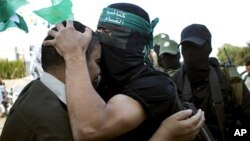Tuesday's exchange of hundreds of Palestinian prisoners for Israeli soldier Gilad Shalit has brought happiness to many in the region - but the underlying confrontations remain.
Israel's release of 477 Palestinian prisoners brought celebrations in the Gaza Strip and West Bank. Under the deal, 550 more Palestinians are to be freed in two months.
Hamas, which controls the Gaza Strip, said it made sure that prisoners from other Palestinian groups and from the West Bank were included in the swap. This has raised hopes of reconciliation with its rival, Fatah, which controls the West Bank.
Some believe the release has strengthened Hamas and weakened support for the head of Fatah and Palestinian Authority, Mahmoud Abbas, because of the lack of progress in peace talks with Israel.
Gaza-based analyst Mahmoud Ajrami says historically, Palestinians held by Israel have been freed only through such exchanges. Ajrami believes the success of this release will lead to attempts to repeat it.
"The Palestinian resistance movement will arrest more Israeli soldiers [in order] to release our brothers and sisters in the Israeli jails," Ajrami said.
The Palestinians were freed in exchange for Gilad Shalit, an Israeli soldier captured by militants five years ago during a clash.
As Shalit was welcomed home Tuesday, Israeli Prime Minister Benjamin Netanyahu promised a stiff response to any acts of violence.
He said Israel will continue to fight terrorism, and that any released "terrorist who returns to terrorism" will be taking his life into his hands.
There are hopes that Shalit's release could lead Israel to ease its economic blockade of Gaza. The blockade of the land and sea boundaries has raised poverty levels in Gaza. Consumer goods are being smuggled through tunnels from Egypt, but so are weapons -- some used later for attacks on Israel.
There are also hopes the prisoner exchange will boost efforts to resume Israeli-Palestinian peace talks. The Mideast Quartet, made up of the European Union, Russia, the United Nations and the United States, is making a push to restart the talks.
But Hamas refuses to recognize Israel and rejects the negotiations. After the successful release of prisoners, its leaders say their goal is to free the remaining 5,000 Palestinians still in Israeli jails.
Many Israelis fear this means more attempts to seize Israeli soldiers in the future.

